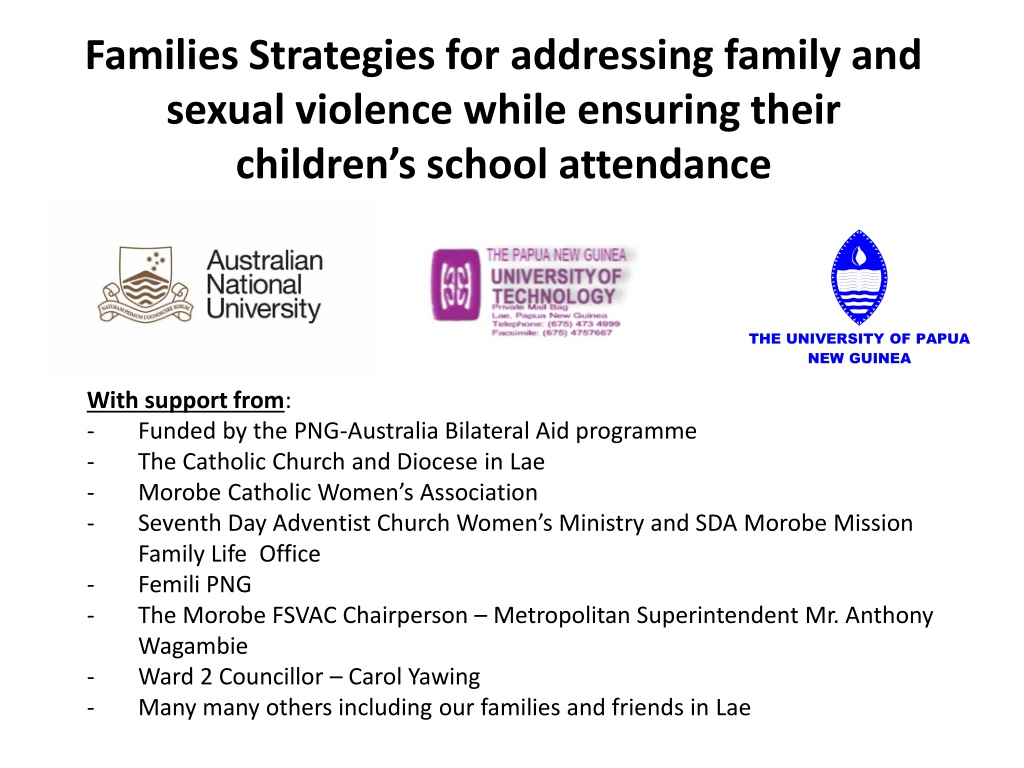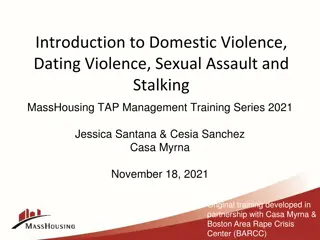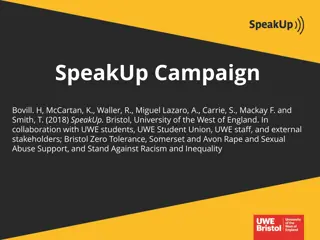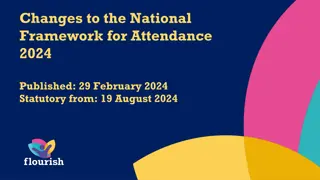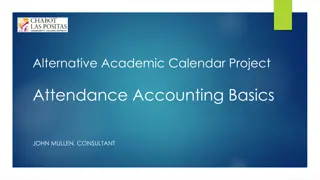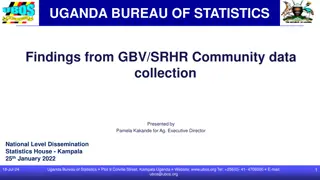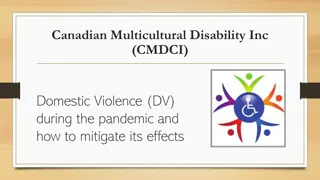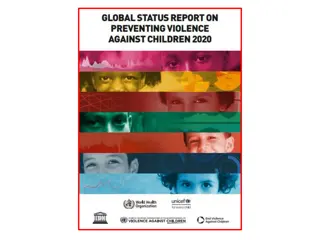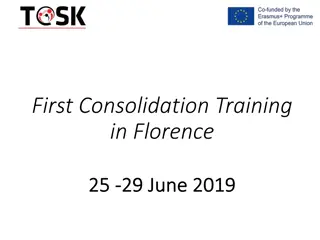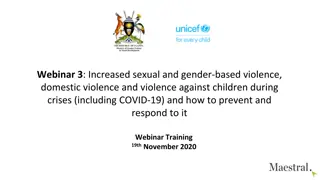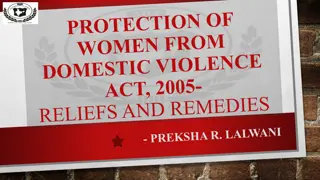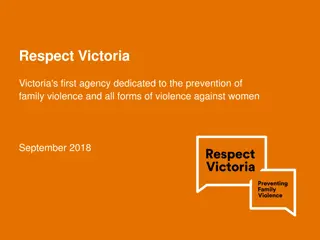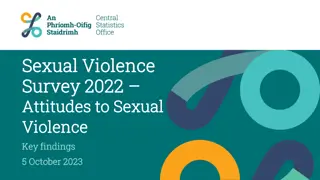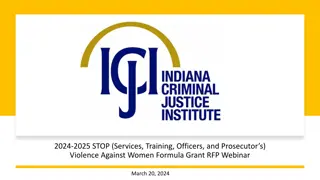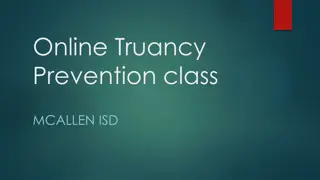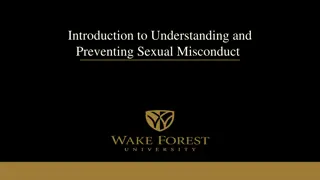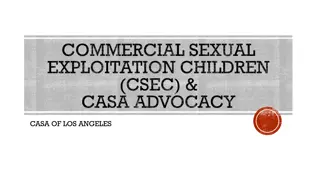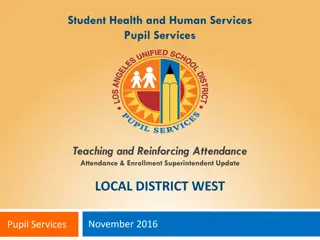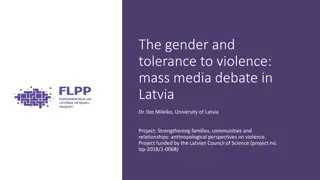Strategies for Addressing Family and Sexual Violence Impact on Children's School Attendance in PNG
This research project, conducted by a diverse interdisciplinary team from the University of Papua New Guinea, explores the strategies employed by families in urban PNG to tackle family and sexual violence while ensuring their children's school attendance. By engaging with community perspectives and experiences, the study aims to inform policy and service provision in addressing these critical issues.
Download Presentation

Please find below an Image/Link to download the presentation.
The content on the website is provided AS IS for your information and personal use only. It may not be sold, licensed, or shared on other websites without obtaining consent from the author. Download presentation by click this link. If you encounter any issues during the download, it is possible that the publisher has removed the file from their server.
E N D
Presentation Transcript
Families Strategies for addressing family and sexual violence while ensuring their children s school attendance THE UNIVERSITY OF PAPUA NEW GUINEA With support from: - Funded by the PNG-Australia Bilateral Aid programme - The Catholic Church and Diocese in Lae - Morobe Catholic Women s Association - Seventh Day Adventist Church Women s Ministry and SDA Morobe Mission Family Life Office - Femili PNG - The Morobe FSVAC Chairperson Metropolitan Superintendent Mr. Anthony Wagambie - Ward 2 Councillor Carol Yawing - Many many others including our families and friends in Lae
Research team Interdisciplinary Michelle Rooney (Economic Anthropology, development, gender) Mary Aisi (Education, Communication and Development Studies) Dora Kuir-Ayius (Social Work, Education, and Development Studies) Miranda Forsyth (Legal Scholar specialising in the Pacific)
Outline of presentation Background to our research question Ethics and fieldwork Emerging issues Economic constraints, poverty and livelihoods School responses for students experiencing FSV at home
Background Urbanisation, gender violence and education in PNG are often addressed separately. Services aimed at addressing gender based violence should also include families plans, values and strategies for educating their children. This research focus is on the perspectives of members of the community in Lae with a view to informing the policy, legal, and service provision terrain. This research is policy oriented and aimed at providing the evidence base for policy makers in these spaces.
Research question What Strategies do families use to address family and sexual violence so that they can maintain their children s school attendance during periods of FSV in urban PNG?
Fieldwork Group meetings with women s and community groups (Over 800 participants): Two at Holy Spirit Parish (Around 65 women) St Therese Parish (Around 35 women) Mary Queen of Peace Parish at Backroad community (Around 50 people) Biwat (Bumbu) compound community (Around 50 women) SDA Tok Pisin Church (Around 500 women) 3 Mile St Stephen Parish community (around 60 women) Ward 2 women s group at 7th Street (Around 35 women) During these meetings we explain research; conduct a focus group discussion around community perspectives of FSV in the community and institutional responses; and we invite interested women to one on one interviews.
Interviewees Many women responded to our invitation for one on one interviews. We were only able to do 70 one on one individual in depth interviews with women. Meetings with institutions 4 focus group meetings with schools Discussions in communities, key informants, about education and schools Publics solicitors office Police A clinic Femili PNG
Emerging results COMMONE ISSUES ON FAMLY VIOLENCE CHALLENGES TO SEEKING SUPPORT SOURCES OF SUPPORT AND SERVICES Chronic and long term violence Viewed as a private matter samting blong ol Wantok system both a challenge and an opportunity some Economic constraints, Poverty and Livelihoods Police constraints (violence and lack of resources) Social constraints Fear Lack of knowledge about police, courts, available services Save pes known police, law people who are not willing to take the issue up to support find solution because are known to either party. Maintenance and custody issues are the longer term affects of violence in relationships Spirituality and prayer sources of strength and hope Church is a place of social safety, networks, encouragement Family Multiple forms of violence Marital intimate partner violence Sons (children s) violence towards family members, especially mothers or towards other family members (drugs and alcohol) Financial neglect especially by fathers especially when they have an affair or take on a new partner. Mistreatment and neglect of elders Dispute of property with elders or women whose husbands leave them losing control over property or assets (especially houses often affecting women and children) maintenance and custody issues after marital breakdown. Institutions providing services Police have improved greatly Toll Free number and police responses have helped to deescalate or prevent further violence. FSVU FSC Femili PNG Refuge centres and Meri Seif Haus being moved out of settlement because it is not safe anymore men climb the fence to get into the women School responses
Emerging results Institutions providing support Institutions providing services Police have improved greatly Toll Free number and police responses have helped to deescalate or prevent further violence. FSVU FSC Femili PNG Police, family support service(Angau), Femili PNG,
Emerging results Chronic Marital intimate partner violence Financial constraints neglect especially by fathers especially when they have an affair or take on a new partner. Victims of fsv rely on family and friends for support
Impacts of economic constraints on mothers and children Non payment of school fees Lack of bus fare Little or no food Low educational levels Major constraint on women s ability to seek support services for FSV
Mothers voices In 2011 my husband left me and our 2 children because I took him to the police for breaking my hand twice. He returned to our village and married another woman. Sometimes we go without food. My older child never went to school when he was younger, he is now 17 and still in primary school (grade 2). I struggle to sell things in the market to support me and my children (DKA 014) When my husband is drunk he gets angry and abuse me and my children. He wakes children from their sleep and swears at all of us. The type of words he uses to swear are not supposed to come from a father to his children. He has had multiple affairs and doesn t support me and the children. I sell things in the market to generate income to buy lunch (food) for my children and pay for bills. My older son resorted to alcohol and drugs and tell his father why should we listen to you? (DKA 006)
Emerging issues and lessons from mothers voices Chronic violence or neglect of mothers and children by husbands/fathers Resilience of mothers Spirituality and prayer sources of strength and hope Church is a place of social safety, networks, encouragement Family
How do schools know if a child is coming from a home experiencing FSV? Inconsistent school attendance or long absences from school Coming late to school Poor performance in class resulting in drop in grades Teachers observations on child s changing behavior patterns Student confides in them either alone or with support from other students Parents inform teachers
How do schools respond when a student is experiencing FSV at home? Counselling so children make informed decisions Providing odd jobs in school during term breaks Providing accommodation in school Teachers and students assisting with food and finances Spiritual counselling Class patrons/matrons identify student and issue, provide initial counselling Referral process guided by Behavior Management Policy Students networking to make referrals Referrals to outside partners by schools Catholic sister schools mutually support each other to transfer students if needed Students in examination years (Grade 8, Grade 10, Grade 12) are supported to complete their exams
Questions to further explore Does Teacher Training include counselling for teachers? What referral processes are schools using to assist children affected by FSV? How can schools assist disadvantaged children when applying 30 days expulsion policy? Can counselling be confused with discipline, or vice versa? How can the resilience of victims of FSV be built?
Recommendations Establish an avenue where all relevant stakeholders are accommodated for victims of FSV to easily access. Providing assistance to ease financial costs of seeking support.
Families Strategies for addressing family and sexual violence while ensuring their children s school attendance THE UNIVERSITY OF PAPUA NEW GUINEA With support from: - Funded by the PNG-Australia Bilateral Aid programme - Femili PNG - The Catholic Church and Diocese in Lae - Morobe Catholic Women s Association - Seventh Day Adventist Church Women s Ministry and Lae Women s office - The Morobe FSVAC Chairperson Metropolitan Superintendent Mr. Anthony Wagambie - Ward 2 Councillor - Many many others including our families and friends in Lae
